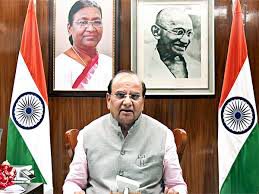New Delhi: As the political battleground in Delhi heats up ahead of elections, a new controversy has emerged, centering around a leaked report from the Comptroller and Auditor General (CAG). The report alleges extravagant expenses on Chief Minister Arvind Kejriwal’s official residence, branding it as a "Sheesh Mahal" (Palace of Mirrors). While the BJP is relentlessly attacking the Aam Aadmi Party (AAP) over the alleged misuse of taxpayer money, the report's timing and selective leak have raised eyebrows, leaving citizens questioning the political intent behind the revelations.
The BJP has taken the issue to the streets, constructing a model of the alleged "Sheesh Mahal" to showcase in Delhi's constituencies. “This is the true face of Arvind Kejriwal, who once vowed to reject VIP culture,” BJP leaders declared in press conferences. They claim the report reveals exorbitant spending on luxury items such as high-end curtains, opulent furnishings, and state-of-the-art equipment.
In response, AAP leaders have hit back with sharp criticism. Sanjay Singh and Saurabh Bharadwaj held a fiery press conference, alleging that Prime Minister Narendra Modi’s official residence is no less extravagant. “The Prime Minister reportedly owns 6,700 pairs of shoes, 5,000 suits, and a pen worth ₹10 lakh. His residence costs ₹2,700 crore and features luxurious carpets worth ₹3,000 crore,” they claimed. These allegations, though dramatic, were presented without concrete evidence, prompting skepticism even among AAP supporters.
While the BJP accuses Kejriwal of hypocrisy, AAP is questioning the very source of these revelations. Why was the CAG report, which has not been officially presented in the Delhi Assembly, selectively leaked to the media and BJP leaders? “How did Sambit Patra get hold of this report before it was made public?” AAP spokespersons demanded to know.
Adding to the intrigue, a check on the official CAG website revealed no recent reports on Delhi, with the last audit related to the state published in July 2022. The apparent leak has sparked allegations of political misuse of the CAG’s authority, with parallels drawn to past controversies.
The controversy has also brought back memories of the 2G spectrum case, where the then-CAG chief Vinod Rai's calculations shook the nation. “Kejriwal himself once used CAG reports as ammunition against Sheila Dikshit’s government. Today, he finds himself on the receiving end,” political analysts observe.
Amidst the noise, the real questions remain unanswered. Are these accusations genuine, or are they part of a broader political strategy? With both sides locked in a bitter blame game, the public is left wondering about the authenticity of the claims and the misuse of institutions in a politically charged environment.
As the elections draw closer, one thing is clear: the battle for Delhi is not just about policies and governance but also about narratives, optics, and who controls the public discourse. The stakes have never been higher, and the air is thick with suspicion, anger, and anticipation.









